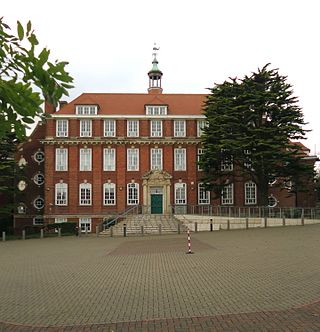
The secretary of state for education, also referred to as the education secretary, is a secretary of state in the Government of the United Kingdom, responsible for the work of the Department for Education. The incumbent is a member of the Cabinet of the United Kingdom.
The Department for Education and Skills (DfES) was a United Kingdom government department between 2001 and 2007, responsible for the education system as well as children's services in England.

The Office for Standards in Education, Children's Services and Skills (Ofsted) is a non-ministerial department of His Majesty's government, reporting to Parliament. Ofsted's role is to make sure that organisations providing education, training and childcare services in England do so to a high standard for children and students. Ofsted is responsible for inspecting a range of educational institutions, including state schools and some independent schools. It also inspects childcare, adoption and fostering agencies and initial teacher training, and regulates early years childcare facilities and children's social care services.
The Higher Education Funding Council for England (HEFCE) was a non-departmental public body in the United Kingdom, which was responsible for the distribution of funding for higher education to universities and further education colleges in England since 1992. It ceased to exist as of 1 April 2018, when its duties were divided between the newly created Office for Students and Research England.

The Learning and Skills Council (LSC) was a non-departmental public body jointly sponsored by the Department for Business, Innovation and Skills (BIS) and the Department for Children, Schools and Families (DCSF) in England. It closed on 31 March 2010 and was replaced by the Skills Funding Agency and the Young People's Learning Agency.

The Further and Higher Education Act 1992 made changes in the funding and administration of further education and higher education within England and Wales, with consequential effects on associated matters in Scotland which had previously been governed by the same legislation as England and Wales. It was introduced during the First Major ministry.

The Quality Assurance Agency for Higher Education is the United Kingdom higher education sector's independent expert quality body. It has a remit to maintain and enhance the quality of teaching and learning in tertiary education in the United Kingdom and beyond. It conducts quality assessment reviews, develops reference points and guidance for providers, and conducts or commissions research on relevant issues.

A sixth form college is an educational institution, where students aged 16 to 19 study typically for advanced post-school level qualifications such as A Levels, Business and Technology Education Council level 3 (BTEC), and the International Baccalaureate Diploma, or school-level qualifications such as General Certificate of Secondary Education (GCSE) examinations and BTEC level 2 qualifications. In many countries this type of educational institute is known as a junior college. The municipal government of the city of Paris uses the phrase 'sixth form college' as the English name for a lycée.

The Scottish Funding Council, formally the Scottish Further and Higher Education Funding Council, is the non-departmental public body charged with funding Scotland's further and higher education institutions, including its 26 colleges and 19 universities.

Sir George Monoux College is a sixth form college located in Walthamstow, London. It is a medium-sized college with around 1,620 full-time students as of 2018.

The Department for Innovation, Universities and Skills (DIUS) was a UK government department created on 28 June 2007 to take over some of the functions of the Department of Education and Skills and of the Department of Trade and Industry. Its head office was based at Kingsgate House, 66-74 Victoria Street, London SW1, which has now been demolished. In June 2009 it was merged into the newly formed Department for Business, Innovation and Skills. It was responsible for adult learning, some parts of further education, higher education, skills, science and innovation.

Brighton, Hove & Sussex Sixth Form College, commonly known as BHASVIC, is a sixth form college located in the Prestonville area of Brighton, England. The college provides post-16 education, including A-levels, BTECs, and GCSEs.

Franklin Sixth Form College is a sixth form college on Chelmsford Avenue in Grimsby, North East Lincolnshire, England, serving more than 2,700 students, including adult learners.

The Commission on Scottish Devolution, also referred to as the Calman Commission or the Scottish Parliament Commission or Review, was established by an opposition Labour Party motion passed by the Scottish Parliament on 6 December 2007, with the support of the Conservatives and Liberal Democrats. The governing Scottish National Party opposed the creation of the commission.
The Institute for Learning (IfL) was a voluntary membership, UK professional body. It ceased operating on 31 October 2014. Although precise membership figures and statistical details had been removed from IfL's webpage prior to its closure, at the end of financial year 2013-2014 IfL were reported as having only 33,500 of their 200,000 members remaining.

The Skills Funding Agency was one of two successor organisations that emerged from the closure in 2010 of the Learning and Skills Council. The agency was in turn replaced by the Education and Skills Funding Agency in 2017.

The Department for Education (DfE) is a ministerial department of the Government of the United Kingdom. It is responsible for child protection, child services, education, apprenticeships, and wider skills in England.
The Young People's Learning Agency for England, commonly referred to as the Young People's Learning Agency (YPLA), was a UK government body, based in Coventry, which funded further education for 16- to 19-year-olds in England. It closed on 31 March 2012, when its responsibilities were transferred to the newly created Education Funding Agency.
Sir David Melville, is a British physicist, academic, academic administrator, and public servant. He was Vice-Chancellor of Middlesex University from 1991 to 1996, Chief executive of the Further Education Funding Council for England from 1996 to 2001, and Vice-Chancellor of the University of Kent from 2001 to 2007.

The Office for Students (OfS) is a non-departmental public body of the Department for Education of the United Kingdom Government. It acts as the regulator and competition authority for the higher education sector in England.












